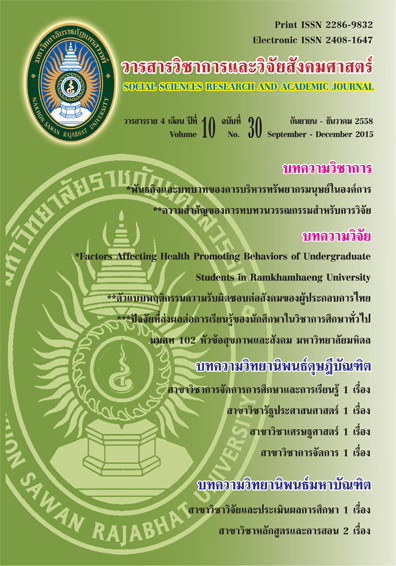ปัจจัยด้านวัฒนธรรมองค์การที่มีอิทธิพลต่อการจัดการความรู้ตามการรับรู้ ของบุคลากรมหาวิทยาลัยราชภัฏนครสวรรค์; Factors of Organizational Culture Influencing Perceived Knowledge Management of Academic Instructors at Nakhon Sawan Rajabhat University
Main Article Content
Abstract
บทคัดย่อ
การวิจัยนี้มีวัตถุประสงค์ดังนี้ 1) เพื่อศึกษาวัฒนธรรมองค์การตามการรับรู้ของบุคคลากร 2) เพื่อศึกษาระดับการจัดการความรู้ของบุคลากร 3) เพื่อศึกษาระดับความสัมพันธ์ระหว่างวัฒนธรรมองค์การและการจัดการความรู้ของบุคลากร และ 4) เพื่อค้นหาปัจจัยด้านวัฒนธรรมองค์การที่เป็นตัวพยากรณ์การจัดการความรู้ตามการรับรู้ของบุคคลากร กลุ่มตัวอย่าง คือ บุคลากรที่เป็นคณาจารย์สายวิชาการ จำนวน 200 คน เครื่องมือที่ใช้เก็บรวบรวมข้อมูล คือ แบบสอบถามเกี่ยวกับวัฒนธรรมองค์การ จำนวน 30 ข้อ และเกี่ยวกับการจัดการความรู้ จำนวน 24 ข้อ ซึ่งผ่านกระบวนการตรวจสอบความเที่ยงตรงเท่ากับ .88 และ .87 ตามลำดับ สถิติที่ใช้ในการวิเคราะห์ข้อมูล ประกอบด้วย ค่าเฉลี่ย ส่วนเบี่ยงเบนมาตรฐาน ค่าสัมประสิทธิ์สหสัมพันธ์เพียร์สัน และค่าสัมประสิทธิ์การถดถอยพหุคูณแบบขั้นตอน ผลการวิจัยปรากฏดังนี้
1. บุคคลากรมหาวิทยาลัยราชภัฏนครสวรรค์มีการรับรู้วัฒนธรรมองค์การ โดยภาพรวมอยู่ในระดับมากที่สุด พบว่าด้านการติดต่อสื่อสารมีการรับรู้มากที่สุด ส่วนด้านการมอบอำนาจมีการรับรู้ต่ำกว่าด้านอื่น
2. บุคลากรมหาวิทยาลัยราชภัฏนครสวรรค์มีการรับรู้การจัดการความรู้ โดยภาพรวมอยู่ในระดับมากที่สุด พบว่าด้านการแสวงหาความรู้มีการรับรู้มากที่สุด ส่วนด้านการจัดเก็บข้อมูลและการค้นคืนความรู้ มีการรับรู้ต่ำกว่าด้านอื่น
3. ผลการวิเคราะห์ความสัมพันธ์ระหว่างวัฒนธรรมองค์การกับการจัดการความรู้ พบว่า วัฒนธรรมทั้ง
5 ด้าน มีความสัมพันธ์ทางบวกกับการจัดการความรู้
4. ปัจจัยด้านวัฒนธรรมองค์การที่เป็นตัวพยากรณ์ที่ดีที่สุด ได้แก่ วัฒนธรรมองค์การด้านการตัดสินใจ ด้านความไว้วางใจ และด้านการมอบอำนาจ โดยมีค่าสัมประสิทธิ์สหสัมพันธ์พหุคูณ (R) เท่ากับ .778 และค่าประสิทธิภาพการพยากรณ์เท่ากับ .728 หรือร้อยละ 72.8
สามารถสร้างสมการพยากรณ์ในรูปคะแนนมาตรฐาน ได้ดังนี้
Z = .299 X4 + .252 X3 + .219 X2
Abstract
The research has objectives as follows: 1) to examine organizational culture according to personne perception, 2) to study the level of personnel knowledge management, 3) to examine the relationship between organizational culture and knowledge management of personnel, and 4) to identify organizational culture factors as predictors of knowledge management according to personne perception. The research samples are 200 academic instructors at Nakhon Sawan Rajabhat University. The data collection instrument is the questionnaire which consists of 30 questions on organizational culture and 24 questions on knowledge management and their IOC is 0.88 and 0.87 respectively .The statistics used in this research are means, standard deviation, pearson's correlation coefficient and coefficient of stepwise multiple regression coefficients. The results show that:
1. Respondents have perceived organizational culture at a high level. The highest level of perception is the communication, while the lowest is the mandate dimension.
2. Respondents have perceived knowledge management at a high level. The highest level of perception is the knowledge acquisition while the lowest level is the knowledge storage and retrieval.
3. The analysis of the relationship between organizational culture and knowledge management finds the all five culture aspects are positively related to knowledge management.
4. The organizational culture factors which are good predictors are decision, trust and authorization. The coefficient of multiple correlation coefficient is (R) .778. The coefficient of forecasting performance prediction is 728 or 72.8 percent.
The forecasting equation can be written in terms of score as follows:
Z = .299 X4 + .252 X3 + .219 X2


